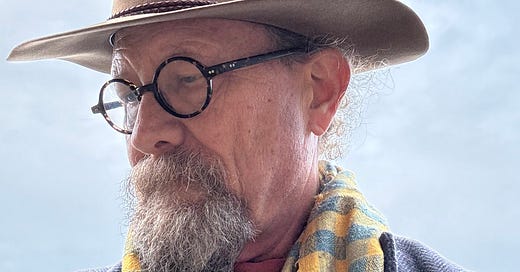Photo: Dec. 25 2023. When I was young, in Hamburg, my father would take the family on Spaziergänge. German has no single word that literally means “take a walk;” the word Spaziergang, conversely, has no exact English equivalent, but roughly means “strolling around to see things.”
We went on Spaziergänge in the Hirschpark in Blankenese on the banks of the Elbe. The park has spectacular examples of European chestnut trees and rhododendron bushes.
It was mandatory to dress to the nines in Sunday finery on these very European excursions, because you were going to “take the air,” (die Luft nehmen) to see and be seen. He and I always wore traditional Tyrolean hats with goat’s hair brushes like the one I have on in this photo. As a little kid I thought these hats were the bomb. You absolutely had to have lots of cool pins on your hats. The city pin for Hamburg can be seen just above the brim.
The example I wear here is a bit of a hybrid, what with the sterling silver and turquoise brooch from New Mexico, but it’s close enough. The scarf I have on is a little less traditional.
Pondering the questions that the use of words raises, it occurs to me that we take so little care about the way we use words in our lives.
We use them unmindfully, without considering their impact on others; we rarely understand the deeper aspects of their meaning, nor do we come to them with the respect they deserve. Words are treated like an afterthought (which in some senses, they literally are), an accessory to the facts. Mere things that can be used, twisted, bent and then discarded the moment it’s convenient to us. They are throwaways, like the plastic wrapping that comes around almost everything we buy these days.
Yet words are sacred things that have a higher meaning. Indeed, the higher or conceptual — the metaphysical — meaning of words has been sensed and investigated by various philosophers since the times of ancient Greece, and even before. There has always been an understanding among those who treasure words and seek their deeper meaning that words are precious things, and should not be treated so casually. Not so easily taken for granted.
This, above all, leads us to two concepts that are quite important in the use of words. Both of them relate to what Gurdjieff called outer considering.
Keep reading with a 7-day free trial
Subscribe to Zen, Yoga, Gurdjieff: Lee's Gurdjieff Newsletter to keep reading this post and get 7 days of free access to the full post archives.





